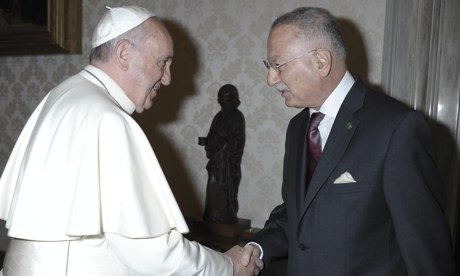Muslim states should broaden rights of non-Muslims, says Islamic alliance
Outgoing head of Organisation of Islamic Co-operation also says west should do more to combat anti-Muslim prejudice
Reuters in Paris
theguardian.com, Tuesday 31 December 2013 19.28 GMT

Pope Francis and Ekmeleddin Ihsanoglu at the Vatican. Photograph: Osservatore Romano/AFP/Getty Images
The outgoing head of the Organisation of Islamic Co-operation (OIC) has said Muslim states ought to broaden rights for religious minorities.
Ekmeleddin Ihsanoglu, who stepped down on Monday after nine years as secretary general of the 57-country group representing the Islamic world, also said western countries should do more to combat an increase of prejudice against Muslims there.
Concern for Christians in the Middle East has risen in recent years among churches worldwide as wars and Islamist rebels have killed or driven many from their homes in the region.
The religious diplomacy of the OIC, which is based in Jeddah, Saudi Arabia, had previously been long focused on a fruitless effort to have the United Nations pass a global ban on insults to Islam. The fate of Christian minorities in Muslim countries had rarely figured in its declarations.
In an email exchange with Reuters, Ihsanoglu wrote: "I have no doubt that there is room for religious freedom improvements in some parts of the Muslim world with regard to allowing non-Muslims to have access to their religious facilities or construction of such facilities."
Christians in the Middle East frequently complain of restrictions or bans on churches there and their leaders, alarmed by the rise of hardline Islamists in the wake of the Arab Spring uprisings, have tried to emphasise their long histories in the region and have urged their communities not to leave.
At a Vatican meeting with Pope Francis on 13 December, the first between an OIC head and a pope, Ihsanoglu said he stressed the need for "greater efforts from OIC member states to foster respect for religious pluralism and cultural diversity and to counter the spread of bigotry and prejudice".
Ihsanoglu said both Pope Francis and Sheikh Ahmed el-Tayeb, grand imam of the prestigious al-Azhar centre of Sunni learning in Cairo, expressed support in recent meetings for his proposal to foster better ties between the world's two largest faiths.
He first floated the idea in 2005, urging western countries to recognise Islam as an official religion and promote better understanding of it through education. The focus then was mostly on what they should do to answer Muslim complaints.
Relations between Muslims and the Vatican, which weighs heavily in the inter-faith balance because its 1.2 billion Catholics make up just over half of all the world's Christians, worsened dramatically the following year.
Pope Benedict's Regensburg speech, which implied Islam was violent and irrational, sparked protests in the Muslim world and cast a shadow over inter-faith relations despite his apology and efforts by leading Muslims and Catholics to mend fences.
After his election in March, Pope Francis said he was especially interested in improving ties with Muslims.
Ihsanoglu said his proposals, for which details would have to be worked out, aimed at a reconciliation as far-reaching as that reached by Christians with Judaism in recent decades.
A Vatican envoy recently visited al-Azhar to discuss resuming relations cut off in 2011 after Benedict condemned attacks on Christians in Egypt, Iraq and Nigeria and said they showed the need for better protection for religious minorities.
Francis is preparing a visit to Jordan, Israel and the Palestinian territories which would have Vatican relations with the Muslim world on its agenda. The date has not yet been set but officials say some time in May seems most likely.
The Chaldean Catholic patriarch in Iraq, where about half the 850,000-strong Christian minority there in 2003 has since fled or been killed, proposed this month that the Vatican make a new effort to help Muslims understand Christianity.
"Among other things, this document should explain, in language compatible with Islam, the magnificent doctrine of religious freedom," said the Baghdad archbishop, Louis Sako.
The OIC, now led by Iyad Ameen Madani of Saudi Arabia, is an intergovernmental organisation of 57 states that aims to protect the interests of the Muslim world. Ihsanoglu, a Turk, said he hoped his successor would follow up on his proposal.